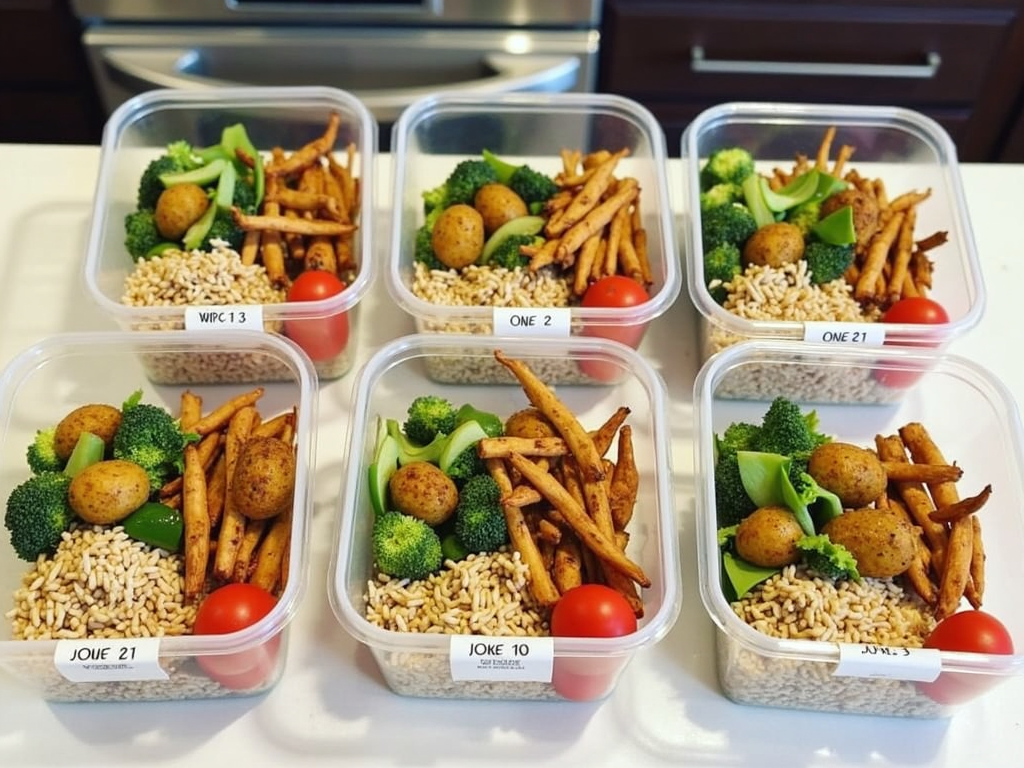In today's fast-paced world, finding time to cook healthy meals can be a challenge. Between work, family, and other responsibilities, it's easy to resort to quick, unhealthy options. That's where meal prepping comes in. Meal prepping is the practice of preparing meals in advance, typically for the week ahead. It's a strategy that can help you save time, reduce stress, and ensure you're eating nutritious food. Whether you're new to meal prepping or looking to improve your skills, this guide will provide you with everything you need to know to get started.

Benefits of Meal Prepping
Meal prepping offers a multitude of benefits that can positively impact your life. Here are some of the key advantages:
- Time-Saving: By dedicating a few hours to cooking on one day, you can save time throughout the week. No more rushing to prepare meals after a long day at work.
- Cost-Effective: Buying ingredients in bulk and reducing food waste can lead to significant savings on your grocery bill.
- Health Benefits: Meal prepping allows you to control what goes into your meals, making it easier to stick to a healthy diet. You can ensure your meals are balanced and portioned correctly.
- Reduced Stress: Knowing what you're going to eat ahead of time eliminates the daily decision-making process, which can be a relief for many.
- Consistency: Meal prepping helps you maintain a consistent eating schedule, which is important for managing energy levels and overall health.
According to a study published in the American Journal of Preventive Medicine30052-8/fulltext), individuals who plan their meals are more likely to have a higher quality diet and lower body mass index.
Getting Started with Meal Prepping
If you're new to meal prepping, it can seem a bit overwhelming at first. But with a little planning and organization, it becomes much easier. Here's a step-by-step guide to help you get started:
- Planning:
- Decide which meals you want to prep. Many people start with lunches or dinners.
- Consider your dietary goals. Are you trying to lose weight, gain muscle, or just eat healthier?
-
Look for recipes that are easy to make in bulk and can be stored well.
-
Shopping:
- Make a detailed shopping list based on your meal plan.
- Stick to the list to avoid impulse buys.
-
Consider buying in bulk to save money.
-
Cooking:
- Choose a day when you have a few hours to spare, like Sunday.
- Prepare all your ingredients first: wash, chop, and measure.
-
Cook multiple dishes at once to save time.
-
Storage:
- Invest in good quality containers that are microwave and dishwasher safe.
- Label your containers with the date and contents.
- Store meals in the refrigerator or freezer, depending on when you'll eat them.
Remember, it's okay to start small. You don't have to prep every meal for the week right away. Start with a few meals and gradually increase as you get more comfortable with the process.

Quick and Easy Healthy Recipes for Work Lunches
One of the best things about meal prepping is that you can prepare delicious, healthy meals that are easy to take to work. Here are a few recipes to get you started:
- Quinoa Salad with Vegetables:
- Ingredients: Quinoa, cherry tomatoes, cucumbers, bell peppers, feta cheese, olive oil, lemon juice.
-
Instructions: Cook quinoa according to package instructions. Chop vegetables and mix with quinoa. Add crumbled feta, olive oil, and lemon juice. Toss to combine.
-
Chicken and Vegetable Stir-Fry:
- Ingredients: Chicken breast, broccoli, bell peppers, snap peas, soy sauce, garlic, ginger, brown rice.
-
Instructions: Cook brown rice. Sauté chicken in a pan until cooked through. Add vegetables and stir-fry until tender. Season with soy sauce, garlic, and ginger.
-
Mason Jar Salads:
- Ingredients: Your choice of dressing, hearty vegetables (like carrots or cucumbers), proteins (like chickpeas or grilled chicken), greens (like spinach or kale).
- Instructions: Layer ingredients in a mason jar, starting with dressing at the bottom. When ready to eat, shake the jar to mix.
These recipes are not only healthy but also portable and easy to prepare in advance.
Effective Strategies for Balancing Work and Health
For many people, balancing a busy work schedule with healthy eating can be challenging. Meal prepping can be a powerful tool in this regard. Here's how:
- Time Management: By prepping meals in advance, you free up time during the week that can be used for other activities, like exercise or spending time with family.
- Nutritional Balance: When you prep your meals, you can ensure they include a balance of proteins, carbohydrates, and healthy fats, which are essential for maintaining energy and focus throughout the day.
- Portion Control: Pre-portioned meals help prevent overeating and keep your diet on track, which is especially important if you're trying to manage your weight.
- Avoiding Unhealthy Options: Having healthy meals ready to go reduces the temptation to grab fast food or unhealthy snacks when you're busy or tired.
Meal prepping can be particularly beneficial for those who work long hours or have unpredictable schedules, as it ensures you always have a healthy option available.

Addressing Chronic Fatigue
Chronic fatigue is a condition characterized by persistent tiredness that doesn't improve with rest. It can make daily tasks feel overwhelming and impact overall quality of life. While meal prepping isn't a cure for chronic fatigue, it can help manage symptoms in several ways:
- Energy-Boosting Foods: Include foods in your meal prep that are known to boost energy levels, such as:
- Leafy greens (rich in iron)
- Nuts and seeds (good sources of magnesium)
- Whole grains (provide sustained energy)
-
Lean proteins (help with muscle repair and energy)
-
Consistent Eating Schedule: Eating at regular intervals can help maintain stable blood sugar levels, which is important for managing energy levels.
-
Hydration: Don't forget to include water or hydrating foods like fruits and vegetables in your meal prep. Dehydration can exacerbate fatigue.
-
Reduced Decision Fatigue: Knowing what you're going to eat ahead of time reduces the mental load of deciding on meals, which can be especially helpful when you're already feeling tired.
For more information on managing chronic fatigue, you can refer to resources from the National Institute of Neurological Disorders and Stroke.
Conclusion
Meal prepping is a practical and effective way to save time, eat healthily, and manage a busy lifestyle. By planning ahead and preparing meals in advance, you can take control of your diet, reduce stress, and improve your overall well-being. Whether you're looking to save time, eat better, or manage health conditions like chronic fatigue, meal prepping can be a valuable tool in your arsenal. Start small, experiment with different recipes, and find what works best for you. With a little practice, you'll be a meal prep pro in no time.
Discuss Here